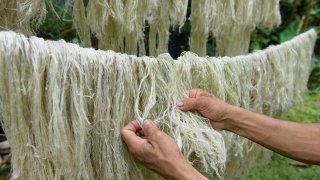
- The production of clothing and footwear is responsible for 10% of global greenhouse gas emissions.
- A recent analysis by the U.K.'s RSA, found that nearly half of the recently listed items on the biggest "fast fashion" sites were made from new plastics, like polyester, acrylic and nylon.
Fashion has a damaging effect on the environment, but there are number of innovations increasingly being used by big industry names which are looking to change that.
The production of clothing and footwear is responsible for 10% of global greenhouse gas emissions, according to data from the European Parliamentary Service and the United Nations.
Polyester is the most widely-used clothing fabric in the world, yet it and other synthetic materials are made using fossil fuels.
Get a weekly recap of the latest San Francisco Bay Area housing news. Sign up for NBC Bay Area’s Housing Deconstructed newsletter.
In fact, a recent analysis by the U.K.'s Royal Society for Arts, Manufactures and Commerce, found that nearly half of the recently listed items on the biggest "fast fashion" sites were made from new plastics, like polyester, acrylic and nylon.
However, there are an increasing number of alternative solutions being picked up by well-known brands.
Here are some examples:
Money Report
Pineapple leaf leather
Carmen Hijosa is the founder of Ananas Anam, a company which produces Pinatex, a natural leather alternative made from pineapple leaf fibers.
It was while Hijosa was working as a textiles consultant for the World Bank in the 1990s, advising on the Philippines' leather exports industry, that she started looking for more sustainable alternative natural materials.
This was when Hijosa "discovered" pineapple leaves, which have fibers that are "very fine but are very strong," she explained.
So she sought to make a mesh as the basis for a leather alternative, and "after 20 years of research and development, Pinatex was born," Hijosa told CNBC on a video call.
Pinatex is 95% plant-based and the production process is "totally transparently sustainable," according to Hijosa.
Working with pineapple farming cooperatives in the Philippines, the leaves, which would typically be left to rot in the ground, are first collected. The fibers are extracted mechanically, then washed and dried in the sun, before being purified in a plant using enzymes.
The fibers are made into a mesh before being shipped in rolls to Spain, where the material is finished with plant-based resin, coated and slightly mechanically broken to soften it.
Pinatex is exported from Spain to more than 80 countries and has been used to make clothing, shoes, bags and interiors.
Last month, Nike launched a sneaker collection using Pinatex. It has also been used by brands like H&M and Hugo Boss.
In 2019, Pinatex was used by Hilton to create the interiors for the world's first vegan hotel suite in London.
Hijosa was also recently named as finalist for the 2021 European Inventor Award for her work.
Ananas Anam is set to expand into Bangladesh and Costa Rica. Hijosa said that while "it's not about being big and extracting natural resources," some growth would be important to help reduce the price and make Pinatex more accessible.
That being said, at between 35 euros ($42) and 58 euros per linear meter, Hijosa pointed out that it's typically cheaper than leather. In addition, she said that up to 30% of leather skins are wasted, while there's hardly any waste from a manufactured product like Pinatex because the entire roll of material is the same.
'Tipping point'
Jeff Martin's journey to create a range of tree-based natural rubber products, which launched under his brand Yulex in 2017, has also been years in development.
"Prior to this, Yulex was the first company to ever commercially produce natural rubber latex in North America," according to the company's website, using the shrub guayule.
Speaking to CNBC on a video call, the Yulex CEO said sustainable fashion was reaching a "tipping point" with more brands seeking to move away from using oil or petroleum-based materials to bio-based or renewable materials.
Martin explained that the production of natural rubber had become a "lost art" because of the "explosion" in synthetics since World War II.
"The art of making things from natural materials has always been there, but we have people who were not used to working with those materials," he said.
Martin pointed out that there are nearly 30 million metric tons of rubber produced and consumed on the planet each year, "most of which ends up in landfill." Rubber is also difficult to biodegrade, he said, and the parts that do biodegrade can release toxic chemicals into the environment.
"We just have to stop taking oil out of the Earth and making things out of oil, when we can make it with natural materials," he said.
Outdoor clothing brand Patagonia was the first major brand to collaborate with Yulex, using its tree rubber for wetsuits. Yulex has since made it's way into the fashion industry, with Stella McCartney using it for a line of Hunter boots in 2019.
Carbon-capture clothing
Post Carbon Lab, a "transdisciplinary design research studio," takes a different approach to sustainable fashion and is still in its early stages, having only registered as a company in 2020.
Its microbial treatment for dying fabrics has probably seen the most traction, co-founder Dian-Jen Lin told CNBC via video call.
This process uses microbes which naturally produce pigmentation, she explained. Post Carbon Lab also uses a synthetic coating, using photosynthetic microorganisms, which not only produces a green hue coloration but also gives the clothing "photosynthetic capacity," or carbon capture.
Post Carbon Lab isn't working on the scale of some other sustainable fashion solutions, but it was used in the collection of Canadian knitwear designer Olivia Rubens last year.
Lin also said that scalability isn't the aim of Post Carbon Lab. Instead, she hoped its concepts encourage behavioral change in people down the supply chain seeing themselves as "guardians" or "caretakers" of clothes.






